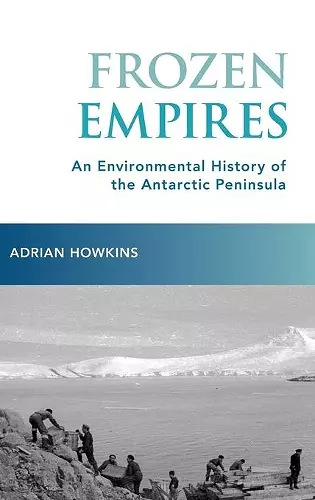Frozen Empires
An Environmental History of the Antarctic Peninsula
Format:Hardback
Publisher:Oxford University Press Inc
Published:5th Jan '17
Currently unavailable, and unfortunately no date known when it will be back
This hardback is available in another edition too:
- Paperback£24.99(9780197533550)

Perpetually covered in ice and snow, the mountainous Antarctic Peninsula stretches southwardd towards the South Pole where it merges with the largest and coldest mass of ice anywhere on the planet. Yet far from being an otherworldly "Pole Apart," the region has the most contested political history of any part of the Antarctic Continent. Since the start of the twentieth century, Argentina, Britain, and Chile have made overlapping sovereignty claims, while the United States and Russia have reserved rights to the entire continent. The environment has been at the heart of these disputes over sovereignty, placing the Antarctic Peninsula at a fascinating intersection between diplomatic history and environmental history. In Frozen Empires, Adrian Howkins argues that there has been a fundamental continuity in the ways in which imperial powers have used the environment to support their political claims in the Antarctic Peninsula region. British officials argued that the production of useful scientific knowledge about the Antarctic helped to justify British ownership. Argentina and Chile made the case that the Antarctic Peninsula belonged to them as a result of geographical proximity, geological continuity, and a general sense of connection. Despite various challenges and claims, however, there has never been a genuine decolonization of the Antarctic Peninsula region. Instead, imperial assertions that respective entities were conducting science "for the good of humanity" were reformulated through the terms of the 1959 Antarctic Treaty, and Antarctica's "frozen empires" remain in place to this day. In arguing for imperial continuity in the region, Howkins counters the official historical narrative of Antarctica, which rests on a dichotomy between "bad" sovereignty claims and "good" scientific research. Frozen Empires instead suggests that science, politics, and the environment have been inextricably connected throughout the history of the Antarctic Peninsula region--and remain so--and shows how political prestige in the guise of conducting "science for the good of humanity" continues to influence international climate negotiations.
The Antarctic Peninsula, an uninhabited, mountainous wildland fronting an icy sea, seems an unlikely place for colonial endeavor and nationalist assertion. But for decades, as Adrian Howkins deftly chronicles in Frozen Empires: An Environmental History of the Antarctic Peninsula, it was contested between the overlapping claims of Britain, Argentina, and Chile, and a place of interest for a number of other nations including but not limited to Norway, the United States, the Soviet Union, Brazil, and India ... The careful and detailed research underlying this readable book is evident throughout ... The book can be read with confidence by researchers, students, and those with a general interest in Antarctica. * J. Donald Hughes, American Historical Review *
Drawing upon archival research conducted in Argentina, Britain, Chile and the USA, [Howkins] offers an alternative, highly illuminating, environmental and imperial perspective from which to view the [Antarctic] peninsula's history ... Its story offers interesting insights into British history, most notably concerning conservation, economics, empire, law, politics and science. * Peter J. Beck, English Historical Review *
In Frozen Empires, Howkins offers a timely and much-needed intervention on this topic....Frozen Empires demonstrates, in short, the significant role that historians can and should play in environmental politics... * Emma Shortis, Metascience *
Deeply researched, well written, and strongly recommended for students and scholars, especially those interested in how Antarctica's political past may be prelude to humankinds environmental future. * James Spiller, Isis Journal *
ISBN: 9780190249144
Dimensions: 236mm x 160mm x 31mm
Weight: 590g
302 pages